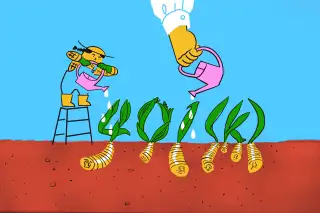It's Crucial to Enroll in Your Company's 401(k). Here's Why — and How to Do It

Welcome to Dollar Scholar, a personal finance newsletter written by a 27-year-old who’s still figuring it out: me.
Every week, I talk to experts about a money question I have, whether that’s “What if I don't have a 401(k)? or “How many credit cards do I need?” As I learn, I share simple ways to improve your financial life… and post cute dog photos.
This is (part of) the 18th issue. Check it out below, then subscribe to get future editions of Dollar Scholar every Wednesday.
Today I'd like to introduce someone important to me. Her name is Farmer Julez. She has brown hair, lives in a forest and exists only in the iPhone game Stardew Valley.
Stardew Valley is like a cross between FarmVille and Pokémon, and I'm obsessed with it. Farmer Julez is my character. Every day, she wakes up, harvests crops, feeds the chickens, milks the cows, chills with townspeople and goes to bed. It's very soothing. There are no penalties for failing challenges or missing deadlines — Farmer Julez does what she wants on her own time, on her own land. The hardest parts are fishing and flirting.
Her 8-bit life seems great, but I do sometimes worry about her. I know Farmer Julez has two goats, but what about health insurance? The farm is doing well now, but does she have an emergency fund if all the peppers suddenly die? Does she even contribute to a 401(k)?
I'm kidding but also curious. In the real world, is it a terrible idea to not have a 401(k)? How do they work, anyway? What should I do to manage mine?
I called Katie Taylor, vice president of thought leadership at Fidelity Investments, with my questions (I conveniently left out my passion for virtual farming). She started by defining 401(k) as a workplace savings account that helps people plan for retirement.
"It is an opportunity for people to save on a pretax basis right out of their paycheck," she says. "It's different than a short-term savings or checking account in that you don't generally take money out once you put it in."
401(k)s are employer-sponsored, meaning whatever company I work for manages the behind-the-scenes stuff. They're more common at larger businesses than small ones and have become "one of the most coveted benefits you can have," as Taylor puts it. (Ditto 403(b)s, which are similarly structured retirement accounts for nonprofit entities.)
Some employers automatically enroll new hires in a 401(k), which is nice because then they don't miss the money coming out of their paychecks. Others offer employer matching, which means they contribute the same amount employees do up to a certain percentage.
Taylor said that ideally I'd be saving between 10% and 15% of my income, but if I can't swing that I should at least max out the match. Otherwise, "it's like leaving free money on the table," she adds.
As you might expect, the sum grows over time. The average 401(k) balance for millennials is $29,000, according to Fidelity. For Gen X, it's $115,400, and for boomers it's $198,000.
I can choose how my money gets invested, but because I'm new to this, Taylor said a target date fund is a good option. Basically, I put in the year I'm going to retire and the fund invests in stocks and bonds for me. It manages the equity allocation based on how close I am to that date, becoming more conservative with risks as I age.
Harris Nydick, a registered investment advisor with CFS Investment Advisory Services in New Jersey, told me that if my company offers a 401(k), I should absolutely take advantage of it. There's no excuse not to… unless I need that money to fulfill basic needs like buying food, shelter and clothing. (Alas, $18 glitter eyeshadow from Sephora does not count as a basic need.)
It might seem like a pain to sacrifice my hard-earned dollars now, but it'll be worth it later on.
"We're all about YOLO and FOMO," he says. "We coined a term, HYPFTIR: How You Payin' for That in Retirement?"
Nydick, who co-wrote a book about 401(k)s, said it's crucial that I prepare for the future. Part of that is trying not to touch those savings until I'm older. It is possible to pull money out of my 401(k) early and/or borrow against it, but I shouldn't unless I'm really desperate. People who tap into their stash before age 59 ½ have to pay state and federal income taxes AND incur a 10% penalty.
I also shouldn't freak out about the markets. Other than reading over the statements and keeping track of the money when I change jobs, my 401(k) doesn't require a ton of maintenance.
"The biggest enemy we have once we've started to invest is worry," Nydick says. "Don't overreact. Don't say, 'Oh my God, this is so great, I'm going to retire early,' [and] don't say, 'Oh my God, where'd my money go, I'm going to be broke.'"
Bottom line: I should participate in my company's 401(k) immediately, perhaps by selecting a target date fund. It'd be great to save 10% to 15% of my income, but I should definitely contribute at least as much as my employer is offering to match. And then I should avoid messing with it.
"For many people, regardless of their age, their 401(k) is the first time they've participated in the market," Taylor says. "While it can seem intimidating, it's always a smart idea to enroll in your 401(k) and start savings as early as possible in your career."